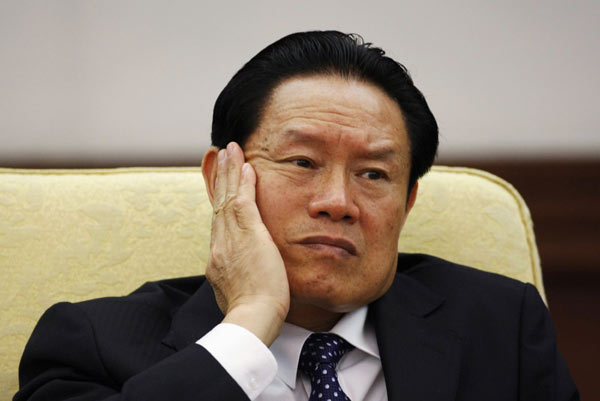Harm from Zhou being cleaned up
By Zheng Jinran and Cao Yin (China Daily) Updated: 2015-01-22 07:35Former security chief had a negative influence on the legal system, annual conference told
 |
|
Then China's Public Security Minister Zhou Yongkang reacts as he attends the Hebei delegation discussion sessions at the 17th National Congress of the Communist Party of China at the Great Hall of the People, in Beijing in this October 16, 2007 file photo. [Photo/Agencies] |
The annual central conference on political and legal work expressed the authority's determination on Wednesday to clean up the negative influence on the legal system from corrupt former security head Zhou Yongkang.
"Zhou, who blatantly traded power for money and sex, has caused severe harm to the Party and the people, left a bad influence within the system and led a number of officials astray," said Meng Jianzhu, head of the Communist Party of China Central Committee's Commission for Political and Legal Affairs.
He called Zhou's case "a grave lesson".
Some officials' legal and disciplinary violations are still having a bad effect on the political and legal system, Meng said, adding that it's because their ideals and beliefs went wrong and values were distorted.
Zhou Yongkang, former security czar of China, was expelled from the Party in December for serious violations of the Party's political, organizational and confidentiality rules, as well as suspected crimes.
Yi Shenghua, a criminal lawyer in Beijing appointed to clean up Zhou's adverse impact, said Zhou's moves in the judicial system have caused disorder over the past decade.
New assessment
Political and legal organizations will reconsider how they assess enforcement and administration, and will remove unreasonable indicators that can be misused - for example the rates of criminal detention, arrest, prosecution, conviction and claim settlement, Meng said.
The proposal drew support from the legal system, said Yi.
"The canceling of this unscientific indicator will effectively reduce wrongful cases," Yi said, explaining that a police station had been required to detain a certain number of people a month, which led to people being arrested for minor offenses.
Dai Peng, director of the Criminal Investigation College at People's Public Security University of China, said that without the pressure caused by the conviction rate, police can take the time and energy they need to pursue an investigation, ensuring it is accurate and complete.
- Govt encourages people to work 4.5 days a week
- Action to be taken as HIV cases among students rise
- Debate grows over reproductive rights
- Country's first bishop ordained in 3 years
- China builds Tibetan Buddhism academy in Chengdu
- Authorities require reporting of HIV infections at schools
- Typhoon Soudelor kills 14 in East China
- Police crack down on overseas gambling site
- Debate over death penalty for child traffickers goes on
- Beijing to tighten mail security for war anniversary







